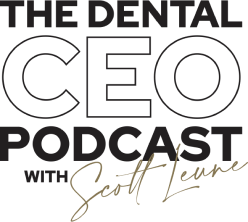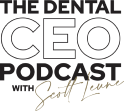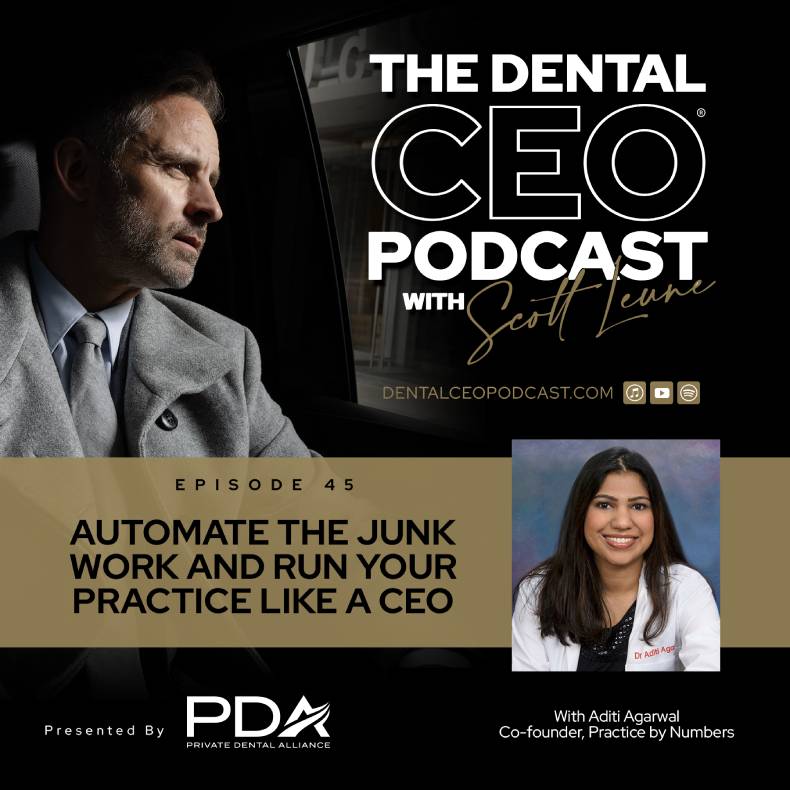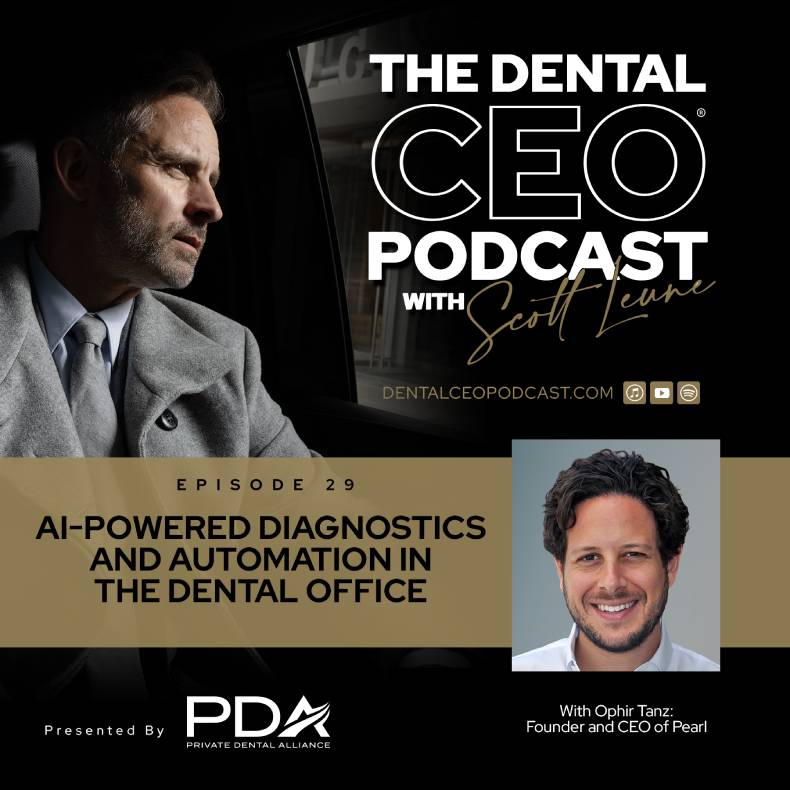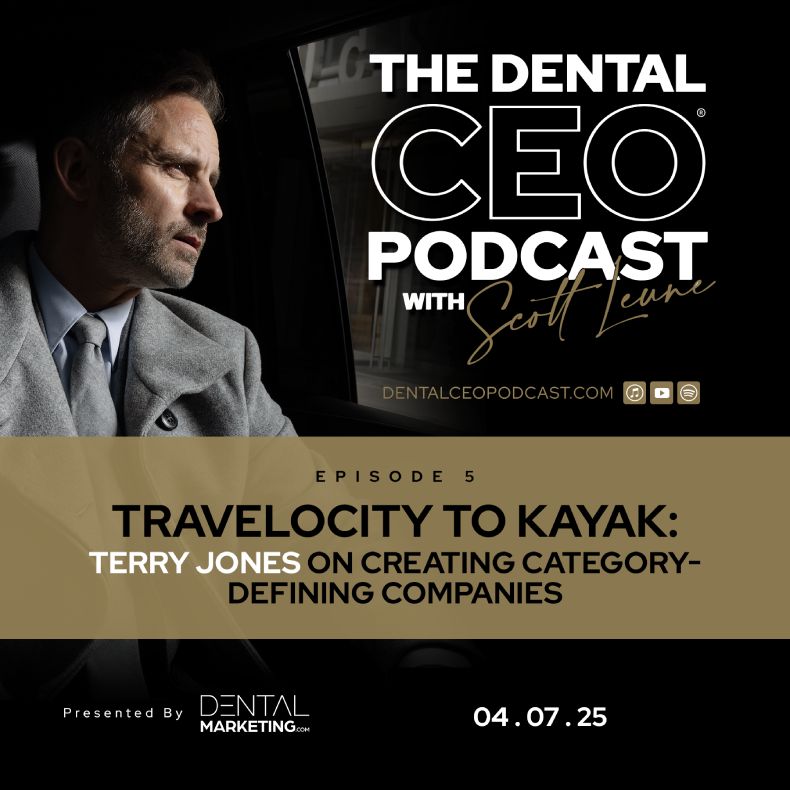Dental CEO Podcast 34: Why You Need to Pay Your Dental Team More
In this episode of the Dental CEO Podcast, host Scott Leune dives into the challenges of rising costs and stagnant fees, exploring strategies to enhance profitability while ensuring dental teams are paid what they deserve. Learn about the importance of maintaining healthy profit margins, optimizing production, and implementing effective bonus plans. Tune in to understand how you can transform your practice into a thriving business that benefits everyone involved.
Highlights
- Strategies for Increasing Team Pay – Examines the pressures of rising employee expectations and practice expenses, then details a framework for paying dental teams at the highest local rates while maintaining practice profitability.
- The Critical Role of Profit Margins and Ratios – Explains essential financial benchmarks, such as ideal staffing costs as a percentage of collections, and why maintaining these ratios is crucial for business sustainability and compensation growth.
- Doubling Hygiene Production Without Added Payroll – Explores actionable methods for increasing hygiene department output without hiring additional staff, unlocking substantial revenue growth.
- Optimizing Scheduling and Filling Holes – Highlights the impact of eliminating schedule gaps and utilizing same-day dentistry opportunities to maximize collections and financial health.
- Crafting Effective Bonus Plans – Delivers key considerations for implementing weekly production-based bonus plans, directly linking team rewards to consistent practice performance.
Speakers

Dr. Scott Leune
Scott Leune, known as The Dental CEO, is one of the most respected voices in dental practice management. From his seminar room alone, he has helped launch over 2,000 dental startups and supported more than 20,000 dentists across practices worldwide. Named one of the 30 Most Influential People in Dentistry, Leune delivers practical, no-fluff strategies that empower dentists to lead with confidence, scale efficiently, and achieve real personal and financial success.
Watch Episode
Read Full Transcript
Scott Leune:
So the dental practice team wants to get paid more. We've got increased costs with inflation, grocery costs are going up, housing costs are going up. It just seems like year after year it gets harder and harder for our dental teams to pay the bills and it's about time they get paid more so they say, so they won. On the flip side, we've got a dental practice that isn't getting higher fees and the dental practice itself is also seeing an increase in costs in lab costs going up and supply costs going up, equipment costs going up, rent escalates every year. We've got debt payments, we've got a problem, we've got a problem in dentistry that we need to pay dental employees more, but we don't have the room, the profit margin to do so, and that is the problem we're going to solve in today's episode of the dental CEO.
So look, we need to pay people more and of course we have been, so those of y'all that are not dentists listening to this, please understand that we have been, as dentists paying more and more and more and maybe you working in dental practice, haven't seen those increases, but costs are going up everywhere for the practice. But of course the dental staff member needs and wants to get paid more and I believe they should. I believe that the people in a dental practice should get paid at the highest levels that we've ever seen today, the highest levels for their area. But there's a caveat to this. They should get paid the most they've ever gotten paid and they need to earn it. And what I mean by earn it is not necessarily like they, they're the best they have ever been. I'm talking about earning the ability to afford it in the company.
Can we run this dental practice as a company too, not just for clinical care for patients, but can we run it as a company so that there's enough profit margin there? There's enough success there financially that everyone in the practice is going to make the most money they've ever made and that is one thing that is needed today in my opinion. So let's dive into this. When we talk about being able to afford to pay people more, we need to understand the concept of ratios of margin ratios. It's not just about does a company make profit, does it make money, does the owner get money from the company? What's also important are the ratios of that money. So what percent of your collections are profit? We need to have healthy ratios. You may have heard in the past, dental practices should have 20 to 25% of their collections go to the category of paying people and maybe 4% to the category of buying supplies, dental supplies and office supplies, maybe 5% or less going to labs.
Those ratios are insanely important because when we can maintain that ratio, that percentage, then the practice can sustain the ups and downs we see from one month to the next. You see, when a practice has a healthy profit margin or a healthy ratio and then it has a bad month next month, it still didn't lose money, right? So the margin itself, how big that margin is, that profit, that percentage is what protects the company from the down cycle. And we see down cycles all the time. There are just generic cycles happening in dentistry typically from the end of April, beginning of May through many times towards the end of the summer. We see a down cycle in a lot of demographics around the country. We also see a down cycle hit pretty hard sometimes in September. Some of you actually call it September because we get hit so hard and in existing practices we see an up in December, January, February, March. In startup practices though December can be very challenging because marketing isn't working so well. So we have these cycles.
In addition to those cycles, we also have the impact of other things like we're short staffed or someone's sick or someone's on maternity leave or those kinds of issues also impact the profitability of the business. So we have to have strong ratios to afford to still be successful when we hit a down moment. We can't pay people more if we don't have strong ratios because paying people more is going to shrink the ratio. So we have to be able to have strong ratios first and then we can afford to pay people more. So what are the ratios? What should we spend on non-doctor employees as a category? If we are in a privately owned practice where the owner is also the dentist and those practices have normal fee structure, PPO plans, some maybe a discount plan, maybe they're fee for service for part of the patient base, a normal makeup, that practice should be between 20 to 25% of its collections in what we might call employee costs.
These are non-doctor employees. If we have an associate driven model, then associates typically produce less for the same employees for the same facility, and it's more difficult to have a healthy ratio on the employee category. Typically we will be between 28 to 30% of collections if we are an associate driven model. Now let's talk about some other models. If we are a fee for service model, that means our fees are really high. That means with the same employees we're collecting more, we would be on the lower end of the range. So if we have an owner dentist fee for service model, we'll be closer to 20%. And the opposite's true. If we run a Medicaid model where our fees are really low, we're going to be able to higher range, right? If we have an associate driven model that does a lot of Medicaid, we're going to be closer to 30% on the employee cost category.
We've got to maintain that ratio because that is the biggest expense in a dental practice. It's the biggest category, and if we screw up that ratio, it can suck away all the profitability of the company to the point where the owner is losing money every month. And then you start to see all kinds of horrible compromises. Horrible things happen in the company. No one wants to hurt and put down the company. We all need to work for a very healthy company. We need to find a way to be successful ourselves while the company's healthy. We have to have both of those things happen. And of course in a dental practice, we also have to have patients taken care of, right? We have to have excellent patient care, but let's assume excellent patient care is going to happen. If a dental assistant wants to get paid more, it has to be an environment where the company itself is healthy.
And to have a healthy company, we have to have these ratios in place. Alright, so let's talk about another thing that's going to impact this. The more we can collect without hiring more people, then the easier it is to have a healthy ratio and therefore we can immediately start paying people more the more we collect without hiring more people. Well, how do we do that? You might be thinking when you're listening to this, oh, we need to get better at collections. Well, really most of the growth that can happen in collecting more has nothing to do with being better at collecting. It has a lot to do with being better at producing. Right now you might already collect almost everything you produce. Maybe you collect 95% and 97% of what you produce. Getting that to 98 or 99% is great, but that's not going to dramatically change the health of the company.
What changes the health of the company in a more dramatic way is producing more. And when we look at production, there's production that comes from two basic categories. The doctor's side of the schedule and the hygiene side of the schedule. It's the hygiene side of the schedule that is almost always underperforming. The hygiene side of the schedule with top performing hygiene teams is going to be bringing in about 40% or more of all the practice collections. Yet when we look at most practices, we see half that number. So what I mean by this is when you look at your hygiene department today, if you're a normal practice, you could double that without hiring more people. You can double that production, which maybe we should do an entire episode on just that. How do we double the production of hygiene department? But we can double the production of a hygiene department by implementing proper care for patients instead of making our hygienists these sweat shot prophy mills that we see sometimes in dental practice.
We can have hygienists be more comprehensive providers of hygiene care and preventative care, imperial care for patients and the production will double when the care gets better. If we're able to have a strong hygiene team give us great production that will result in more collections without hiring another for an office person without hiring another scheduler or treatment coordinator, without hiring more dental assistants, right? Without hiring more hygienists, that will give us more collections, more revenue, more money coming in, and that money coming in could be the big difference between being able to afford a normal range of salaries for everyone and being able to afford the highest level of salaries for everyone. So one component of being able to pay people more is looking at the hygiene department and having them become masters of production and clinical care. Now, outside the hygiene department, we've got the doctor's side and production from the doctor's side comes from diagnosing the dentistry.
It comes from having a patient say yes in the operatory, we might call that clinical case acceptance. It also comes from the patient saying yes when they see how much it costs. We call that financial case acceptance and then of course we have to collect it and those areas, a lot of people touch those areas. Even a dental assistant will touch the area of case acceptance. A hygienist can assist with case acceptance, can assist with diagnosis. The front office of course is getting financial case acceptance, but even what the team and the clinical side of the practice says is going to impact the treatment coordinator's ability to get financial case acceptance. In other words, this is a team led event. Producing dentistry on the doctor's side of the schedule is impacted by the entire team, and if we can make that production go up without hiring more people, the company can then afford to pay everyone more money. Now let's add another layer to this. Filling holes in the schedule.
When we have a schedule that has a hole in it, we're paying everyone, even though we have a hole, we're paying rent even though we have a hole, we're paying the loan payment, we're paying utilities, we're paying it support every month. All of our costs still exist even though we have a hole. And so the practices that have gotten very organized at filling holes become practices that can afford to pay everyone a lot more money because there's a lot to gain when we fill that hole. Filling a hole can have an automated component where we are automatically sending out messages every day to fill whatever holes we have. Filling holes could also be someone's entire job depending on the size of the practice. Filling holes can happen from the patients that are already in the chair today, maybe they're in the hygiene chair and we're going to fill a doctor's hole with a hygiene patient that says yes to care. And so same day dentistry becomes very valuable to the company, very profitable practices that have a big same day dentistry component are practices that can afford to pay people more.
When we step back from this, what I'm basically trying to say is that we need to be able to change the practice profit if we want to change the team's salaries. And by the way, just to make sure I'm clear, just to make sure you understand me, my own personal philosophy is that employees in the dental practice should always be making the most money they've ever made and probably some of the highest salaries in that area. And if we can't afford to do that, I've got the wrong team members. You see, I would rather work in an environment where everyone's making the most money they've ever made and we've earned it than flipping this around and kind of paying people what they're worth, maybe based on their experience and it's not, maybe not the highest levels, and then we're not earning a lot of profit. (16:05) I only want to work with people that are getting paid the highest amount they've ever made in their life, but then we have to have the requirement that the company can afford it. So that person that's making the most money they've ever made has to be one of the ingredients, one of the reasons why our company is super profitable and can actually afford to pay that much. It's difficult being an employee in a dental practice. It's a hard job. There are emotional stresses, there are time stresses. It's just stressful all around. Sometimes there's clinical needs, there's business needs and know-how that are needed. Work comes in waves and at the end of the day, you feel spent and you got to go home and you got to pay a lot of bills. My opinion is if you're going to work in a dental practice, you need to make a whole lot of money compared to other people in dental practices and what you've made in the past. (17:05) However, it's impossible to make that much money unless the company is super profitable and we have healthy ratios. So if we're going to pay everyone more in a dental practice, we've got to change what this practice looks like. We've got to change the performance of it. We have to upgrade the things that drive in dentistry. We got to answer more calls. We have to convert more patients and schedule them. We have to diagnose well. We have to have great clinical acceptance with the help of the team. We have to have great financial case acceptance. We have to fill the holes, we have to collect the money, and it has to be at a level that's different than the way it's being done today. So if you're an employee listening to this, you do great work today. You're proud of how you do things and what you do works, but what I'm saying is you're going to have to stop doing it that way and start doing it a way that works better If we want to have pay that is better.
We're used to how we do things. Maybe as an athlete, I'm used to running a mile in whatever, eight minutes. I'm used to that and I'm proud of that and shoot, I'm getting older and I'm like, that's pretty good. But what I'm saying is I got it, but if you want the bigger trophy, we're going to have to run the mile in seven and a half minutes now, not eight. It goes both ways. Now let's talk about a bit what happens when a practice gets into that healthy ratio, that kind of financial flow state where every day we're producing more and collecting more, and every month we've got these healthy ratios and we're paying everyone a lot of money already. What if everyone's making, let's call it the top fourth of our area and our practice is even more profitable? That is where we need to also insert a bonus plan.
You see, not only do we need to be able to build a practice as a team, build a practice that's super profitable so that it can pay all the team members at the top fourth, but we also need to implement a bonus plan so that when we get even stronger than that as a company, the team is getting their portion of it too. So this bonus plan, this bonus plan that we need to put in place, I want to give you a couple of thoughts on it. I could probably record another episode on just bonus plan, but a couple of thoughts. Bonus plans need to be connected to hard work and achieving financial success. Of course, of course it does. But what I really mean by that in my mind is when someone works really hard this week and we hit a good number this week, we need to have the bonus this week.
So it's based on immediate gratification of working hard and achieving a high goal. That means a bonus plan is typically based on adjusted production, not collections, because collections can be diluted out over two months. We can work really hard this week but not collected for a while. It needs to be on adjusted production. That's an immediate connection to the work that we did, and it needs to be weekly and we need to set the bonus so that we only pay more money. We only pay a bonus when our ratio gets extra healthy. So if our goal is I'm just going to make something up, 25% of our collections goes to the team and we pay the team really well and we've produced even more than that, then the overage needs to be 25% of the overage needs to go back to the team. We're always at 25%, whether we are producing normal or we're producing high.
When we're producing normal, everyone gets a great pay, but when we're producing high, everyone gets even more. And that is what I think is missing in a lot of practice. There's either no bonus plan or the bonus plan they have may be damaging the company or maybe too convoluted and complicated to understand. So it's not even changing anyone's behavior or it's unachievable and you never even hit it, and that's kind of demoralizing, right? So what we need is to, let's think of this in a linear way. Step one is we need to pay people the highest level and immediately require the company to be able to afford it. If that step doesn't happen, we need to swap the people. You see, we need to pay people the highest level and the company has to be able to afford it. What I don't want to do is pay people a low level and then have low level performance.
So I'll go back to this in a bit, but that's step one. Then if we have a company that can afford to pay people a high level, we need to implement the bonus plans so that as we keep growing the company without adding more people, and we get above that, we get even super high, super healthy. We take that super part and a portion of that goes back to the team as well. And this will result in the team on a bad week, making a high salary and on a good week making almost an unreasonably high salary and the owner will have high profit, right? So remember what I'm saying here. We have to earn that high salary first and then when we pay out bonus, we are earning that bonus. The company's becoming profitable enough to earn it. This set of goals needs to be communicated every week.
Someone in the practice needs to be the goal cheerleader, the one tracking it, the one letting everyone know the communicator. Like on Monday morning, Hey guys, we are $5,000 under goal for this week. So this is going to be the week in the beginning of the week where we all stretch a bit. Doc, I might book you through lunch. We might have to stay half an hour late to make some extra calls, but we are going to stretch this week because we're running below the goal. We have to achieve the goal. That's what healthy looks like. Now, some weeks we're going to be above the goal and that's going to be a week where we don't have to stretch, we don't have to stay late, we don't have to work through lunch. That's a goal where that's a week where we just get to be right? But some of the weeks we're going to have to work harder and it's going to be the bonus cheerleader or the goal cheerleader that is letting us know to directing us, what kind of week is this and what do we need to do to make sure that by the end of the week our company is healthy and is able to afford these high salaries that we're now so happy that we're getting.
If we think through this, I want to give you a kind of a hypothetical situation. Let's say you've got a dental assistant that is applying for you and in your area, I'm just going to make something up on the low end dental assistants with no experience get paid, I'm just going to make something up 15 bucks an hour, right? And on the high end dental assistants with a ton of experience, get paid 25 bucks an hour. Again, I'm just making it up. So that's the range of your area, 15 to 25, you've got a dental assistant that is applying for a job. Now, let me ask you as a dentist, what kind of dental assistant to you want experience-wise and skill wise? You probably want the very best dental assistant that you can find. Now, the dental assistant that applies for you, they have two years experience.
They're not the most experienced person out there. What do you offer them? Let's say you want to hire them. You like their attitude, you think they've got potential. What do you offer them? My opinion is you offer them 25, you offer everyone 25. The job pays 25. The top level of the area is what you offer anyone and everyone that you decide to hire, and the deal is that they're going to have one or two months to level themselves up to lock in and to become the dental assistant that deserves that amount of money. So if they don't, you need to find someone else. And here's the deal, because you're paying 25, you can find someone else very quickly. When you pay more than everyone else, you are going to attract more applicants and you're going to get more yeses. You need to pay top dollar and you need to hire and demand top skill that they earn that top dollar.
That is philosophically speaking where I'm coming from. But remember, I'm also coming from a place that says our company is healthy. We have good ratios, we have consistent profit. If your company today is not healthy, you are going to have to go through this kind of transition period of becoming healthy and maybe you can't just dive in and pay everyone more, right? You have to be healthy to afford to pay people more. Maybe healthy means stop spending so much money on things. Maybe healthy means producing more in hygiene or producing more on the doctor's side. But at the end of the day, if we fast forward into this vision and say, okay, what does the future actually look like? What it looks like is every person on the team has a guaranteed base salary that is at the highest level of the area, even the new hires do.
And we also as a company have the healthiest margins that we demand. And if we get even better, if we have a really good week and we blow past that in a good way, we are going to share the fourth of that with the entire team. Even though they're already making the highest level they can as a guarantee, they're going to get paid even more than that. In that situation, everyone wins. The team wants to stay. The team feels financially valued. The owner has healthy profit margins. The owner doesn't have to compromise things. The owner has consistency. When we try to implement something new, we're all financially aligned to implement it. And these are things missing in most practices. Most practices, the team doesn't feel valued. They don't feel financially valued. The owner doesn't feel like there's consistency in profit. The owner doesn't feel like they can just do anything or implement anything.
There's so much pushback. There are bad months. What I'm describing is the opposite of that. It is the solving of all of those problems. So to conclude here, we've got to go through a transition period where we make the business healthy enough that we can then pay everyone top dollar. So what I want is I want your team paid at the highest rate they've ever been paid a high rate for your area, and I want them to earning a bonus. But team, I want you to grow the practice so much that it can pay you that and still be really healthy and you can help with that. Every single person in the practice has their hands on some knob that makes that practice bigger and healthier. Whether you're answering the phone or scheduling patients filling holes, you're presenting clinical care, you're presenting financials, you're collecting, or you are someone that influences the patient to do the right thing,
all of you have a component of this formula, and I want you to be the very best, which is better than what you've been. I need you to be better because the business has to be better to give you a salary that's better. And so the practices that are successful at ending up in this position are practices that you walk in and people are just a little happier. They also move quickly when they need to, but they relax when they can and they don't seem to lose people very often. Everyone just feels like they're finally in that place that makes sense, where what they're doing professionally earns them enough for their life and they feel proud of where they work and how they're treated. Now, of course, I'm not even talking about other components of working somewhere, like having a great attitude and having this leadership mindset and creating a wonderful work environment and being someone that tries to implement new things and being self-aware and all those kinds of things also matter.
But maybe that's for another podcast episode. Well, we've had actually some podcast episodes and that kind of thing. This is a podcast episode about: we need to pay people more and they need to earn it. We need to pay people more and damn it, they need to earn it. And if we are missing one of those two things, we're suffering. Are you missing one of those two things? Are people not earning the highest level or are they not building a company that can afford it? We have to have both of those things if we want this new chapter in our lives of high pay dentistry. I hope you got some ideas from this. I hope this was a cool little break, something to think about, and I hope I don't get too much hate mail from dentist or non-dentist over the things I've said. I'm just trying to be real.
I'm trying to talk about this in today's day and age, and this is not the time where we're trying to cut, we're trying to save, we're trying to pay less, and this is also not the time. We can just do the same old thing as employees or do less or complain. This is a time where everyone needs to start earning more money, earning more money, doing more and differently so that the company can afford to pay more, and then damn it, the company needs to pay more. That's where we're at right now, and that was our podcast episode here. Thank you so much for listening and tune into the next one. This is Scott Leune with the Dental CEO Podcast.
SUBSCRIBE TODAY
Subscribe now and receive a 25% discount code for Scott Leune’s upcoming events. Plus, get podcast episode alerts and exclusive subscriber perks.
